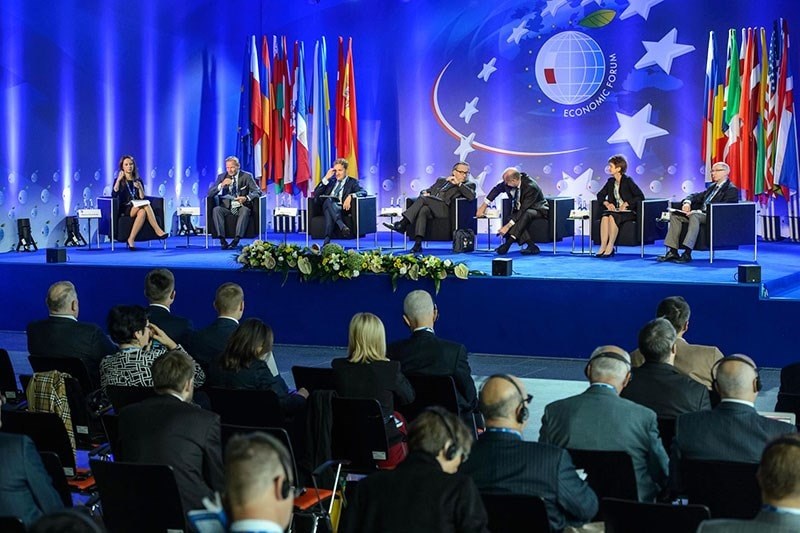Scandinavian experts at the 25th Economic Forum in Krynica

Regional policy
Panellists of the Forum of Regions – Society discussed, among other things, the currently lively topic of revitalisation of cities, trying to find an answer to the question "how to effectively protect and enliven the city centre?".
The presentation entitled "Zero emissions by 2025. How Copenhagen has become an eco-metropolis?", which inaugurated the Forum, was delivered by a Dane, Hans Christian Christiansen, a senior specialist at the Copenhagen Municipal Office.
What was extensively discussed was the regional policy. Panel "Regions as the driving force of the economic growth in Europe" was attended, among others, by Jan Lundin, Director General of the Council of the Baltic Sea States from Sweden. The participants discussed city, region and state reputation management. The panel's guest was Frida Roberts, the Communications Department Director at the Swedish Institute (SI).
Joakim Larsson, the Chair of the Regional Council of Western Götaland, was invited to "New model of innovation as a path to intelligent .and specialised regions" discussion.
The issue of modernisation of buildings as a path to economic stabilisation and energy security was discussed by Oyvind Aarvig, a Senior Adviser at the Planning Department of the Norwegian Ministry of Local Government and Modernisation.
The debate of the Economic Forum – European Union and its Neighbours could not be complete without a panel devoted to sustainable development of business. Using a strategy based on sustainable development is not only a challenge, but also a source of possibilities and opportunities which, if used well, may become a new basis of success for numerous companies and organisations. Mikkel Skott Olsen, the Responsible Business Director at VELUX Group from Denmark, tried to answer the following question: how to keep balance between the aspiration for success and growth on one hand and care for positive relations with the environment and stakeholders on the other hand.
Debates of the Economic Forum – State and Reforms
In that section, Scandinavians had particularly many things to say. The experience was shared between the participants of such thematic discussions and panels, as:
Unemployment among young people – analysis of government aid programmes in Europe; invited guests included Morten Binder, the Director of the Danish Agency for Labour Market and Employment, and Berit Kvam, the Editor-in-Chief of Nordic Labour Journal, a Norwegian magazine.
Social Investment – philanthropy or a business strategy – invited guest: Mika Pyykkö, the Strategic Area Director at Finnish Innovation Fund (SITRA), Finland
Labour market – challenges in the changing world - Project manager of Jobcenter Aarhus from the Danish city of Aarhus.
Panel "Strength and position of women in the contemporary world. Break the "glass ceiling" with a high-heel shoe – women in business and politics" was attended by Kristina Jullum Hagen, the Deputy Director of the Norwegian Entrepreneurs Confederation (NHO), whereas panel "Women 50+. Undiscovered potential and new challenges for the economy", by Monica Ulfhielm, the Chair of the Swedish Pensioner Association in the Stockholm Region.
Mervi Pitkänen, the Director of Machine Technology Center Turku Lt in Finland, participated in discussion "Clusters vs. innovations and entrepreneurship", whereas Mika Pyykkö, the Strategic Area Director at Finnish Innovation Fund (SITRA), took part in discussion "Social Investment – philanthropy or a business strategy ? Social investment as a business strategy".
Do we need an army
During this year's 25th Economic Forum in Krynica, a lot of attention was paid to security issues. The participants discussed the threats connected with the situation in the Middle East and Ukraine, including the so-called hybrid war conducted there, as well as the stability of the Baltic region. The participants of "Army – is it still the guarantee of security in the 21st century?" discussed the role and importance of armed forces.– They are a specialised authority of the state, subject to political power. It is politicians who indicate what actions the army undertakes during peace, conflict and war – said Greg Simons of the Swedish Institute for International Affairs, and he pointed out that the army does not decide about its role itself.
Individual thematic sections were attended by representatives of Scandinavian organisations which deal with various aspects of the defence issue: Hanne Severinsen, Project Manager, Deputy to the Danish Parliament (1984–2007) and activist of the Helsinki Committee for Human Rights in Denmark; Mats Hellström, Director at Nordens Biskops Arnö from Sweden, Kristi Raik, Expert of the Finnish Institute for International Affairs in Finland, Swedish MP Margareta Cederfelt, as well as Kari Liuhto, Director of Balticum Centre in Finland.
The 25th Economic Forum in Krynica took place between 8 and 10 September 2015.
Based on:
www.forum-ekonomiczne.pl
Polska Zbrojna:
http://www.polska-zbrojna.pl/home/articleshow/17068?t=Armia-nadal-jest-p...
Photo: Polska Zbrojna



 EUR 4.2612 zł
EUR 4.2612 zł USD 3.6804 zł
USD 3.6804 zł DKK 0.5714 zł
DKK 0.5714 zł SEK 0.389 zł
SEK 0.389 zł NOK 0.3722 zł
NOK 0.3722 zł